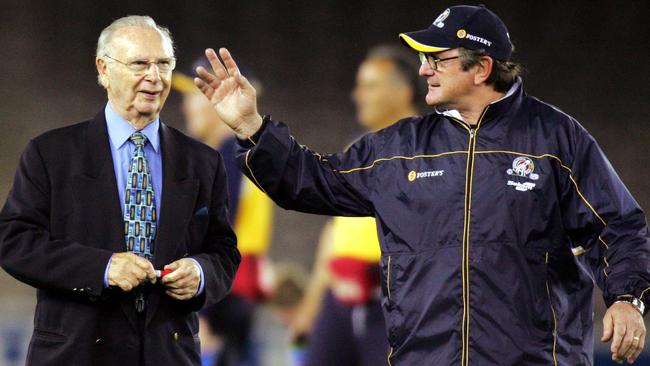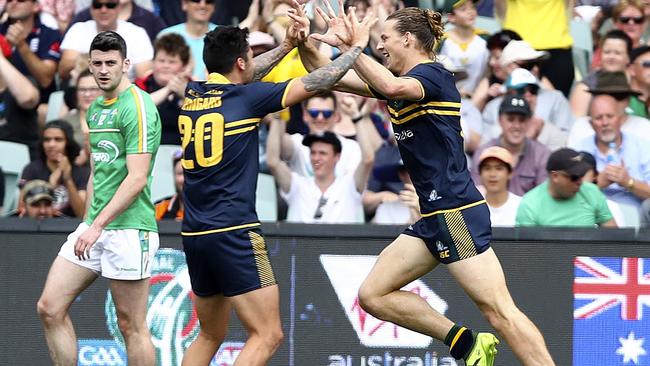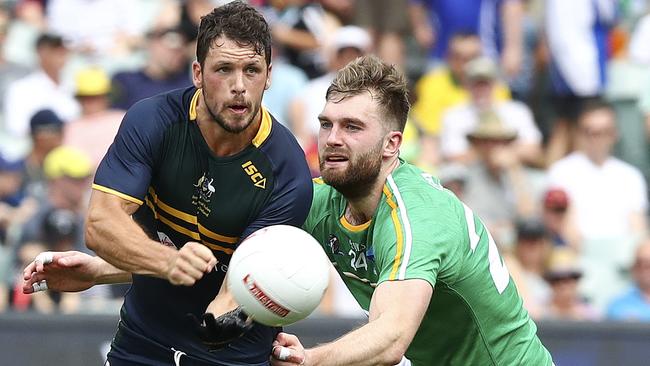Australia honour the late Harry Beitzel, founder of International Rules, with win over Ireland
AUSTRALIA’s star-studded International Rules team has honoured footy media pioneer and series founder Harry Beitzel with its impressive win over Ireland at Adelaide Oval, Michelangelo Rucci writes.

AFL News
Don't miss out on the headlines from AFL News. Followed categories will be added to My News.
PUT that down as a salute to the late, great Harry Beitzel.
Three months after his death — and 50 years after the Hall of Famer started the Galahs tours to Ireland — Beitzel would have marvelled at how the Australians used their skills, their professional fitness base and their tactical sharpness to win the first International Rules Test at Adelaide Oval.
Australia’s 63-53 win marks the first victory in four Tests in Adelaide since 1986, but this is more symbolic as a tribute to Beitzel.
TRIBUTE: HARRY BEITZEL, A FOOTY MEDIA PIONEER, PASSES AWAY
INTERNATIONAL RULES: BEITZEL’S LEGACY LIVES ON WITH SERIES AGAINST IRELAND
One Australian — Brownlow Medallist and Fremantle captain Nat Fyfe — did most to honour Beitzel’s dream of putting Australia’s homegrown game on the world stage.
Fyfe has translated to the hybrid game the ominous aura he carries in AFL football when he sits between centre and the goalfront. And he can work that heavy, round Gaelic ball that swerves and swings off the foot in ways Australian cricketers would wish they could master for the upcoming Ashes Test series.

Fyfe’s six-point goal eight minutes into the 18-minute third term — to give Australia an 11-point lead — was not only confirmation of his command of the round ball, but the turning point of the contest.
Australian football works to time and space. There is much less space on the rectangular field compared with the AFL oval — to the point the statisticians (they even kept statistics in this game) counted inside-45s rather than inside-50s.
INJURY BLOW: SCOTT PENDLEBURY BREAKS FINGER AGAINST IRELAND
The Australians used time to hold the round ball. Some would say they over-possessed; others would argue minimising Ireland’s access to the ball was tactically smart.
The Irish did move the ball with greater speed and greater precision than the Australians, as should be expected considering it is their Gaelic ball — and not the Australian Sherrin — that is the challenging feature (for the AFL players) in this hybrid-compromised game.

And when the Irish had greater control of the ball in the first 30 minutes, they had two imposing forwards — Michael Murphy and Conor McManus — to aim towards and delivering 11 of 14 goals.
Australian football purists would have loved that part of the Irish game — two specialist, stay-at-home forwards eager to take a mark and to have a set shot.
It will not be lost on Richmond great Kevin Bartlett — the Tiger who took most exception to his team being taken out of its traditional black-and-yellow jumper in this year’s AFL Grand Final — that the “clash jumper” rule does not apply to internationals. Australia was in dark blue, rather than a striking gold that would have contrasted perfectly with Ireland’s light shade of Shamrock green.

The final note on the first Test — the first International Rules game in Adelaide since 2001 — was the crowd count of 25,502. AFL boss Gillon McLachlan, who started the day on the polo fields of Melbourne, had hoped to be among 40,000 fans at Adelaide Oval’s first sampling of IRS.
The show moves to Perth for the last AFL act at Subiaco Oval on Saturday, complete — to emphasise its international theme — a video referee from South Africa. Yes, the truly neutral South Africa. Whether this series does return to New York to relive the 1967-68 tours by the Galahs to the tough fields of the Bronx in the Big Apple is hard to tell.
McLachlan wants it. The AFL players won’t object to an end-of-season trip to New York — nor to continuing to wear a national guernsey. And Harry Beitzel would have his legacy to the game of Australian football live on.
Originally published as Australia honour the late Harry Beitzel, founder of International Rules, with win over Ireland


